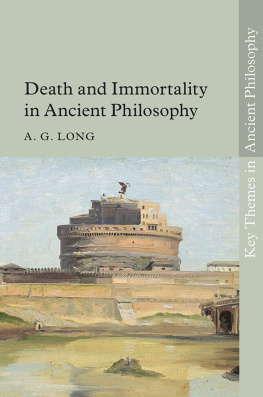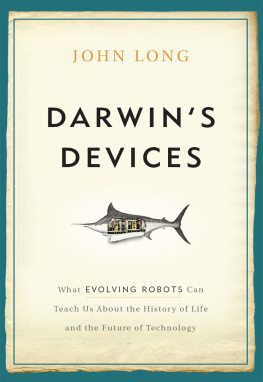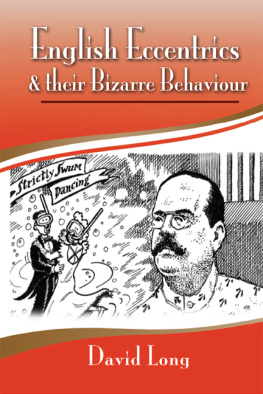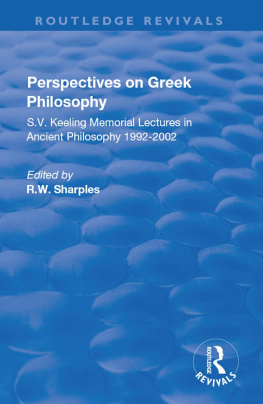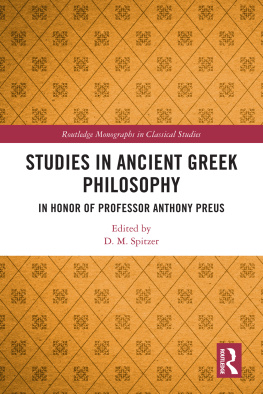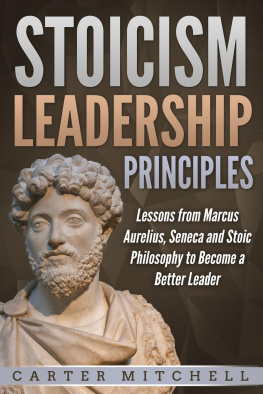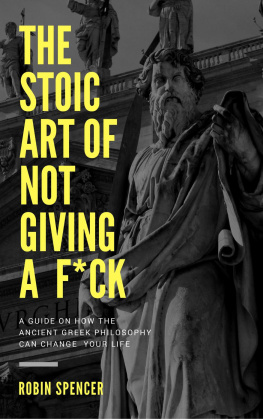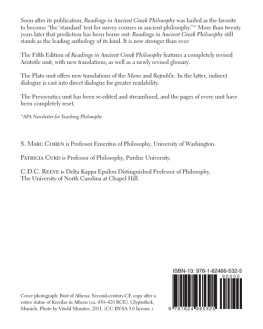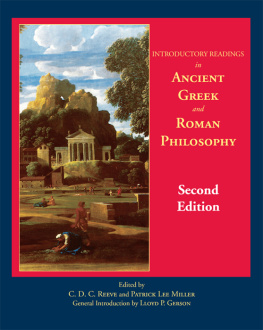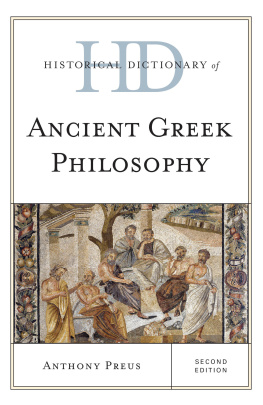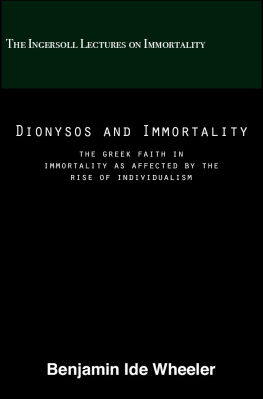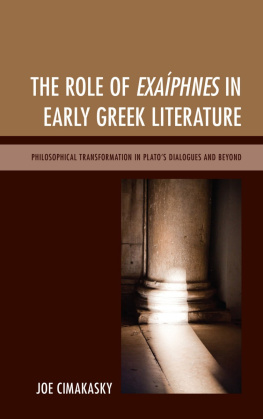Death and immortality played a central role in Greek and Roman thought, from Homer and early Greek philosophy to Marcus Aurelius. In this book A. G. Long explains the significance of death and immortality in ancient ethics, particularly Platos dialogues, Stoicism and Epicureanism; he also shows how philosophical cosmology and theology caused immortality to be reimagined. Ancient arguments and theories are related both to the original literary and theological contexts and to contemporary debates on the philosophy of death. The book will be of major interest to scholars and students working on Greek and Roman philosophy, and to those wishing to explore ancient precursors of contemporary debates about death and its outcomes.
A. G. LONG is Senior Lecturer in Classics at the University of St Andrews. He has translated (with David Sedley) Platos Meno and Phaedo (Cambridge, 2010) and is the author of Conversation and Self-Sufficiency in Plato (2013) as well as the editor of Plato and the Stoics (Cambridge, 2013).
University Printing House, Cambridge CB2 8BS, United Kingdom
One Liberty Plaza, 20th Floor, New York, NY 10006, USA
477 Williamstown Road, Port Melbourne, VIC 3207, Australia
314321, 3rd Floor, Plot 3, Splendor Forum, Jasola District Centre, New Delhi 110025, India
79 Anson Road, #0604/06, Singapore 079906
Cambridge University Press is part of the University of Cambridge.
It furthers the Universitys mission by disseminating knowledge in the pursuit of education, learning, and research at the highest international levels of excellence.
www.cambridge.org
Information on this title: www.cambridge.org/9781107086593
DOI: 10.1017/9781316091562
A. G. Long 2019
This publication is in copyright. Subject to statutory exception and to the provisions of relevant collective licensing agreements, no reproduction of any part may take place without the written permission of Cambridge University Press.
First published 2019
Printed and bound in Great Britain by Clays Ltd, Elcograf S.p.A.
A catalogue record for this publication is available from the British Library.
Library of Congress Cataloging-in-Publication Data
Names : Long, Alex, author.
Title : Death and immortality in ancient philosophy / A.G. Long, University of St Andrews.
Description : New York : Cambridge University Press, 2019. | Series: Key themes in ancient philosophy | Includes bibliographical references and index.
Identifiers : LCCN 2019008215 | ISBN 9781107086593 (alk. paper)
Subjects : LCSH : Immortality (Philosophy) | Death. | Philosophy, Ancient.
Classification : LCC B 187. I 45 L 66 2019 | DDC 129.0938dc23
LC record available at https://lccn.loc.gov/2019008215
ISBN 978-1-107-08659-3 Hardback
Cambridge University Press has no responsibility for the persistence or accuracy of URLs for external or third-party internet websites referred to in this publication and does not guarantee that any content on such websites is, or will remain, accurate or appropriate.
Acknowledgements
I started writing this book at the University of Toronto during a Research Fellowship provided by the Leverhulme Trust. My thanks to the Leverhulme Trust and to the scholars and students in Toronto with whom I started to explore immortality in Plato and Empedocles, especially Lloyd Gerson, Brad Inwood and Martin Pickav. During the visit to North America David Ebrey and Suzanne Obdrzalek gave me very helpful comments on my interpretation of Platonic immortality. Back in the UK Sarah Broadie and Anthony Hooper kindly commented on parts of the book, and I have been helped by other scholars visiting or working in St Andrews, particularly Mehmet Erginel, Stephen Halliwell and Peter Woodward. I have also benefited from discussing immortality in early Greek philosophy with Phil Horky and Simon Trpanier, and Stoic eschatology with George Boys-Stones. In the final stages of the project Li Fan, Yun Zou, Siyi Chen, Kaicheng Fang and Rui Xu organized seminars in Beijing and Shanghai on immortality and the philosophy of death, and I received excellent suggestions and objections from them and the other participants. My thanks to the organizers and participants at all the other events (in Cambridge, Durham, Edinburgh, Northwestern, St Andrews and Toronto) where parts of the book were presented and discussed, and to the editors of this series for their expert guidance. Thanks as ever to Jess for her love and encouragement and now to Ben for imposing a non-negotiable deadline.
Parts of my discussion of Plato in have been taken from my contribution to Authors and Authorities in Ancient Philosophy (edited by Jenny Bryan, Robert Wardy and James Warren), also published by Cambridge University Press.
Abbreviations
LSJ
H.G. Liddell, R. Scott, H. Stuart Jones and R. McKenzie (1996) A Greek-English Lexicon. Oxford, Clarendon Press.
SVF
H. von Arnim (190324) Stoicorum Veterum Fragmenta , 4 vols, Leipzig, Teubner.
Introduction
The I discuss death in Greek and Roman philosophy. Considering the topics in that order, immortality before death, will, I hope, seem more reasonable in the light of passages that use the language of immortality to describe the best human lives. Platos Timaeus describes how during their lives people can, to an extent, attain immortality, and Epicurus calls immortal the good things enjoyed in a virtuous persons life. When we consider what comes after life, there is a widely recognized disagreement between Plato and Epicurus. In several Platonic dialogues Socrates argues that the soul is immortal and persists everlastingly after death, whereas Epicurus argues that at death the soul loses all cognitive capacity and is disintegrated. Epicurean discussions of death try to make the prospect of non-awareness and non-existence a source of mental resilience, not despair.
In the first part of this book I draw attention to another ancient debate, less recognized in recent work on ancient philosophy, about what it means to be immortal. This other debate is related to philosophical theories about the immortal gods and the cosmos, but it also emerges when philosophers use immortality in their discussions of human beings and human ethics. The ethical side of the debate will come into view in chapter 2, where I examine Platos writing about immortality and love. The cosmological or theological strand can be introduced by the following question: if gods are inhabitants of the cosmos, and if, as some philosophers hold, the cosmos as we know it will eventually come to an end, can the gods be immortal? The philosopher-poet Empedocles and the early Stoics, especially Chrysippus, try to retain the gods immortality in a world-system of merely finite duration, and this affects what they say about human immortality as well. Their answer is, roughly speaking, to distinguish between (a) death as a regular feature of the world we know and (b) the end of this world-system. Calling the gods immortal, which in Greek suggests deathless, is to say that they, unlike human beings, are not subject to the intra-cosmic process called death; it is not to call them everlasting, as they will not outlast the end of this world-system. In early Stoicism there is nothing irreverent in that view of the gods immortality. But Platonists and Epicureans, despite their disagreement on other questions, would unite in rejecting it. For example, the Platonist Plutarch says, with the Stoics as his target, that it is absurd to regard gods as immortal and yet not everlasting. But then Platonists and Epicureans never had to confront the problem of immortal gods in an impermanent world-system. Platonists hold that the world-system in which we currently live will last forever. Epicurean gods are not, at least in a straightforward sense, inhabitants of this world: either they live outside the visible world, or, according to a different interpretation of Epicurean theology, the gods are our own mental constructions of what an endless, perfectly happy creature would be.

